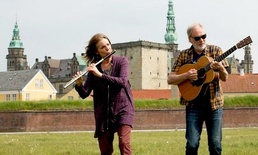Community Action Begins with an Invitation
By Gary Howe | June 9, 2018
Traverse City is known statewide for its citizen participation. I’m proud to be part of that heritage and have spent many years as an engaged citizen. And through that work, I saw results.
But it can be hard work. Sometimes it feels exhausting and difficult to even show up. Life gets in the way. There’s a deadline to meet. The dishes need to be put away. The dog needs a walk ... again. The car is in the shop. It’s too cold to go out because it’s snowing in May. Acting on behalf of my community would be great, but some days it’s all I can do to get through the day-to-day grind.
I'm lucky to know another active citizen who shows up and makes a difference every day: Ty Schmidt, the director of Norte! Traverse City's bike-centric, youth-focused 501c3 advocacy organization. His positive and persistent energy is perfectly suited for Norte's mission of building stronger, better connected and more walk/bike friendly communities by empowering youth and the young at heart. Schmidt’s positive energy is difficult to resist, and it's contagious. So earlier this year, when he invited me to join his team for a Systems Practice course offered through NorthSky Nonprofit Network, I couldn't say no. But I wondered, do I have the time? The energy? And what had I signed up for anyway? What in the world is Systems Practice, and why is it important?
Systems Practice is a way to explore wicked community problems by analyzing the underlying dynamics of an issue. Diabetes management, food security, and housing are examples of wicked problems that Systems Practice students faced in the past — problems without any simple solutions because of the many pieces pulling in different directions and ever-changing circumstances. When you begin to approach a solution to a wicked problem, another obstacle presents itself, so you re-calibrate and respond in kind. Then you lather, rinse, and repeat in response to the next obstacle in a neverending loop. A solution is always close enough to keep you going, but always out of reach because of pesky, interconnected forces.
The challenge Ty put before our group was more theoretical than most: What empowers or inhibits people from speaking up and acting on community problems they’re passionate about?
To begin, we assumed that involvement in your hometown is healthy; the more people engage with their community, the healthier the community will be. Put another way, community health reaches its zenith when its members are empowered to act on its behalf.
Traverse City is fortunate to have a robust nonprofit sector that’s sustained by dedicated volunteers, donors, and participants. We benefit from an engaged citizenry that shows up to voice their opinions and share their thoughts and concerns. But despite our reputation as a vocal and engaged community, many people aren’t fully engaged as citizens. Far too many voices simply aren’t heard at all in our community. Our team's mission was to explore the dynamics at work in influencing people’s willingness and ability to act on behalf of their community.
In the end, our system narrative focused on the relationship of factors that influence individuals and groups. Fundamentally, we found a connection between a sense of belonging and community action. When that sense of belonging includes a level of openness and inclusiveness to others and new ideas, individuals and groups are primed to be inspired into action. For example, Safe Harbor was formed when people united to stop other people from freezing to death after tragedy left them on the streets. The Safe Harbor group was ready to respond to a catalytic event.
So what stops us from taking action? Some of it’s our mindset — the ‘my vote doesn’t matter’ mentality. Other reasons are structural, like transportation systems. Say you work long hours and then face a long daily commute, both of which chip away at precious free time that otherwise might be spent as an engaged citizen. Finally, there are transactional factors, like growing tribalism, which shuts us away from fellow citizens and ideas.
But surprisingly, we found in the end that most roadblocks to active citizen engagement can be overcome by a personal invitation to participate. Combine the invite with a little guidance on the actions someone can take, and the momentum has already begun.
The takeway: Invite someone to your circles of engagement. Work with them for the health of the community. When you are a primary voter this August 7, bring a friend. When you attend a neighborhood meeting, bring a young adult and let them speak. Rally your neighbors behind a long-term initiative to influence local government. As Schmidt likes to say, all it takes to create real change is ordinary people being awesome.
And it all begins with an invitation.
Gary L. Howe is a local volunteer and place advocate. He sends gratitude to the team members of Grassroots Advocates for Healthy Communities for their commitment to healthy communities and healthy dialogue. NorthSky Nonprofit Network will offer its guided Systems Practice course again this fall, and you can invite awesome people to join your team. Visit northskynonprofitnetwork.org.
Trending

Searching for a Sugar High
In the words of Cookie Monster, “NOM NOM NOM.” It’s cookie season, and we’re here for every gingerbr… Read More >>
Christmas in Sweden (by way of Benzie)
Musical duo Ingemar and Lisa Johansson, also members of Song of the Lakes group, bring “Christmas in Sweden: A Musical… Read More >>
Fighting Harder for Local Women and Children
Traverse Bay Children’s Advocacy Center (TBCAC) has been navigating a particularly challenging year. Though CEO Lande… Read More >>


